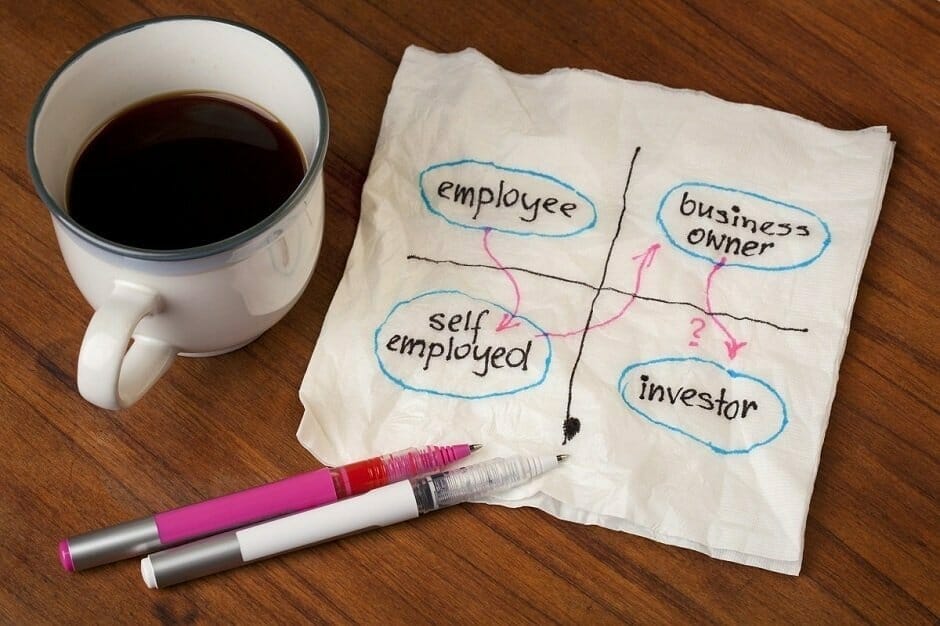
“Three years ago, almost to the day, I woke up with a deep dread,” a friend told me.
“Facing another day in my same job was crushing. I had been putting off a decision: Stick with the stable, well-paying job I knew well—or give it all up to fulfill a dream.”
Sound familiar?
If you feel stuck at work—restless and confused—you’re not alone.
Employee engagement is low across the globe. 85% of employees aren’t feeling connected with their work or their companies. More likely than not, you’re one of them.
We spend so many hours per day and so many days per year working at our jobs. It’s natural to take a step back to look at the big picture—to imagine what your career could be like:
- “What else is out there?”
- “What jobs am I qualified for?”
- “What companies or organizations should I be looking at?”
- “What options do I have moving forward from my current role?”
- “How do I pivot to a new field—and should I?”
As my friend recounts, “Those days were brutal. I had no idea which decision was right for me. I couldn’t even consider looking for jobs, because I didn’t know where to start.”
When push came to shove, she ultimately chose to go after her dream.
Years later she’ll tell you going after that dream job was the best decision she ever made.
She got the confidence to take the next step in her career from talking to people who could tell her what was ahead of her.
You can do the same—you don’t have to stay stuck in your current job.
Don’t stay stuck in the cycle of career paralysis

We get it. Figuring out the next step in your career isn’t easy.
It’s hard to know what’s out there. Everyday new jobs and new fields are being created. Existing roles are morphing, and it’s difficult to keep up.
It’s hard to know what you are qualified for. Job titles and descriptions differ widely from each other, across companies and fields. Plus, job ads rarely indicate what the job truly entails.
It’s hard to know what fits. Company culture is very important, but also very subjective. What may be true for the writer of one online company review may not be true for you. Online reviews can add noise, not clarity, when you aren’t sure of your direction.
Not knowing these things can feel like you’re stuck in the middle of Times Square with people rushing by you in every direction, making you feel overwhelmed and confused.
While surrounded by a huge network of people, you feel alone in the crowd.
Common reactions to career indecision
When you’re feeling stuck at work and are unsure of your next move, you’re likely to do one of these four things:
1. Stay stuck at the same job.
You keep doing work that doesn’t work for you. You can waste hours scanning online job postings, company profiles, and employee reviews, hoping a direction emerges—but it doesn’t.
Career paralysis sets in, so you just stay stuck at work.
2. Trial and error by trying new jobs.
You jump blindly into something new: a new job, or maybe an entirely new industry. But bouncing around doesn’t mean moving forward.
For example, having three jobs in four years doesn’t always translate into progress. We all expect to learn from our mistakes, but when it comes to jobs, finding something that’s a good fit without enough information is slow and difficult.
Jumping from job to job to try to find a good fit is taxing, unproductive, and could steal years from your life and income.
3. Chase the “shiny object” until reality sets in.
When you are looking for a change, you can be lured into what a recruiter describes as “the perfect job.” But are you sure is it perfect for you? Sadly, your excitement for the new job wears off quickly.
When the reality of the new job sets in, you realize that you’ve traded one mistake for another one.
4. Give up and retreat.
You quit. You give up. It may not be as drastic as moving into your parent’s basement, but you’ve stopped pursuing something better. The problem with quitting is that it’s very hard to get the willpower to start up again.
From a hiring perspective, people like to hire candidates who are already employed. Withdrawing makes it even harder for you to resume your forward momentum.
What do these four reactions to career indecision have in common?
In every case, you are trying to navigate the next step in your career alone. That’s the real mistake.
But there’s a better way.
To get out of the career rut you’re in, you need a “lay of the land.” The best place to get the career information you need? From someone who can see what you can’t.
If you take that first step today, you can get your career moving in less than 30 days.
Navigating today’s job market

Today’s job market is fast-paced. You are likely going to change jobs multiple times. You may even switch career fields.
And if you do it right, you’ll be rewarded.
Studies show that people who change jobs every two years make 50% more money after ten years than those who don’t.
Back in the day, career paths were clear and certain: you picked a career path, and you could see the next 20 moves ahead. That was before job boards, the great recession, and the boom of the sharing economy.
Today, the only path you can see is the one behind you—the steps you’ve taken, not the ones ahead. If you’re feeling stuck at work, you need to take your career advancement into your own hands and create your own path.
But where do you start?
Managing the paradox of choice

It’s normal to feel paralyzed by too many options.
With so many options, we have more freedom than ever before to choose a job and career that suits us best. But when we’re faced with a massive number of choices with no basis for evaluating them, we freeze like a deer in the headlights. This phenomenon is called The Paradox of Choice. In the work world, it’s called career paralysis.
Finding the information we need to help us understand our options is the key to narrowing our choices so we can make a decision and break free from career paralysis. While the internet is the first place we go with our questions, it’s not always the most useful, especially when it comes to exploring careers. In fact, all of the information on the internet can leave you feeling even more paralyzed than before.
When we need personalized advice, we get personal, and connect with the people around us. In fact, we do this in many parts of our lives.
Consider this example:
Allie was moving from Minneapolis to Austin, a place she’d never lived before.
She knew the tactical steps of how to rent an apartment, but what she didn’t know was where in Austin to live. Without knowing where, she couldn’t look for an apartment. In a very competitive rental market, Allie knew her indecision was costing her great apartment opportunities as time continued to tick.
She tried researching online but found most of the advice conflicting or unreliable. That might be fine for picking a restaurant for dinner, but not for picking a neighborhood to live in. Allie was stuck, and getting stressed and worried.
That’s when Allie reached out to a friend-of-a-friend, Toby, who had moved to Austin several years prior.
Toby explained the differences between various neighborhoods like housing options, transportation, and the general vibe. Toby knew all this because he had lived in different places in Austin over several years.
In a single conversation, Allie got the specialized information she needed, narrowed her choices down, and felt equipped to make a final decision. Toby also introduced her to people who could help her with her move and apartment search.
People are social creatures. We’re wired to help—if only you ask.
When planning a career move, people with five to ten years of experience in their field are best at explaining the broad landscape. They can help you understand career options and trade-offs to help inform your career path going forward.
Asking someone for their career advice helps you find your next step faster. It also helps create a relationship with someone who feels invested in your success. These people are often connected to those who can help you take the next step in your career, once you figure out what it is. You can’t get that kind of help online.
Exploring career path options starts with networking—the new way
The best way to break the cycle of career paralysis and find your next career step is to talk with people in your network who have the answers you need—not random people.
The ones who have more experience in your desired field and can explain your options and trade-offs.
Does that mean, “networking”?
Sort of.
It means having meaningful, one-on-one conversations with people in your network. It’s not that awkward, fake networking you’ve been avoiding at all costs.
Today’s networking is really connecting in a genuine way.
Those who are moving ahead and switching careers successfully are connecting. It’s hard to stay stuck in the same career when you’re actively connecting with others in your network.
Career exploring that works

So what does networking the modern way look like?
Let’s take a look at how it worked for Haley.
Haley knew she wanted to get into the technology field in general. But, she wasn’t sure what roles or organizations to pursue. Without knowing that, Haley couldn’t start job searching.
She was stuck in career paralysis.
Haley’s roommate suggested she talk to a former coworker, Claire. Claire had been working in the tech field for about eight years. Haley reached out to Claire, and they set a time to meet.
When Haley and Claire met up, their conversation clicked. Claire knew everything Haley wanted to know about the tech industry.
She gave Haley an overview of the local tech field and explained her options. It turned out, there were several roles and companies Haley wasn’t aware of. Claire walked through the trade-offs between various options. At the end, Claire offered to introduce Haley to several relevant connections.
After being stuck in career paralysis for months, Haley finally had a good idea of what direction she wanted to pursue. She also secured a list of networking contacts to jumpstart her progress.
Haley and Claire’s experience is typical of connecting conversations today. We hesitate to call it networking. Instead, we refer to it as “connecting.”
Having a few conversations with people who understand your field can give you all the information you need to feel confident deciding on your next career move. You can’t get that online.
Start networking the modern way, today
Don’t put off taking the next step in your career. If you stop yourself before you even try, you’ll be stuck in the same place you are now. Reach out to someone in a field you’re interested in to get the ball rolling. You never know what you might find.
To make that outreach email easy, use our FREE Email Builders.
You’ll get step-by-step coaching while writing your networking email, saving you from trying to write from scratch and from awkward, generic email templates.
Just a few conversations can get you unstuck and moving on to a career you love.
Can we send you a useful email?
More articles like this one, tips you can really use, and advice that makes your next career move easier.
Sue Wollan Fan is the Founder & CEO of MANGO, a free networking tool whose mission is to expand opportunities for all by making networking easier, accessible, and more human. She has mentored hundreds to succeed professionally while serving as a corporate executive, nonprofit leader, tech entrepreneur, and mother of three. She is passionate about helping others do work that matters.